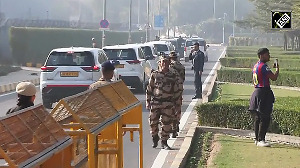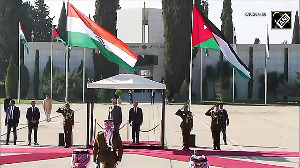Acknowledging that only India and Pakistan can resolve the issues between them, Senator Richard Lugar, Indiana Republican, who chairs the powerful policymaking Senate Foreign Relations Committee, has said that it is "more important than ever that the United States sustain active engagement in South Asia to encourage continuation of this positive momentum".
In his opening remarks, during a hearing of the committee he convened to consider the prospects for rapprochement between India and Pakistan, Lugar said, "We have seen opportunities for peace squandered in South Asia in recent years. To ensure success, it is crucial that both parties prevent extremists from disrupting the process.
"Stability in this troubled region is vital to US national interests, both because an Indo-Pakistani conflict could escalate into nuclear war and because of the potential nexus between terrorism and weapons of mass destruction.
"Hostility between India and Pakistan boosts Islamic extremists in the region, and provides them with fertile ground for terrorist recruitment.
"Greater instability also means that nuclear weapons could fall into the wrong hands."
He said a stable South Asia in which Pakistan and India engage each other will eventually weaken the extremists. "It will allow both countries to focus more time, energy, and resources on building better lives for their people."
He noted that "US diplomacy in South Asia has already paid off by helping to avert a possible nuclear war in 2002. India and Pakistan have taken positive steps since that time, including resumption of transport links, restoration of diplomatic ties, and implementation of a ceasefire along the Line of Control.
"They have also agreed to start technical level talks on relaunching bus service between the capitals of the two portions of Kashmir, which would allow families to reunite for the first time in decades."
However, Lugar cautioned that notwithstanding "this promising atmosphere, normalisation will take time and will require both sides to make difficult political decisions on matters of longstanding dispute.
"We have seen hopeful examples already. President [Pervez] Musharraf has said that Islamabad is willing to consider giving up its traditional demand for a plebiscite to resolve the status of Kashmir, as long as India is willing to show reciprocal flexibility. For his part, Prime Minister [Atal Bihari] Vajpayee has conceded that India is willing to discuss all the issues relating to Kashmir."
The lawmaker said that both leaders "deserve praise for these bold moves", but pointed out that it was imperative to "recognise that they also face the opposition of entrenched interests and hawks in their own countries who will try to undermine or complicate these diplomatic openings".
He recalled that "twice in December, President Musharraf was the target of assassination attempts".
Lugar said that Washington "can contribute to the easing of tensions and advance its own national security interests by exploring ways to assist both sides with nuclear security".
He said that as the recent report of an Independent Task Force cosponsored by the Council on Foreign Relations and the Asia Society had recommended, "we should seek new ways to bring India and Pakistan into the global nonproliferation system. We should encourage Indo-Pakistan nuclear discussions and confidence building measures and the Administration's recent expansion of our nonproliferation dialogues with each side".
Lugar spoke of the "considerable expertise in nuclear threat reduction" that the US has and suggested that "we should use this, consistent with our international obligations, to facilitate exchanges between Pakistani and Indian security experts and offer them assistance on tightening export controls and border security, and the protection, control and accounting of nuclear stockpiles and arsenals".
The lawmaker also said it was vital that "the US must remain vigilant, especially in light of recent reports that Pakistani scientists, with or without government approval, may have supplied Iran, Libya, and North Korea with nuclear technology and materials. Pakistan must demonstrate, through deeds not words, that it is serious about its commitment to preventing weapons proliferation and its ability to secure its nuclear weapons".





